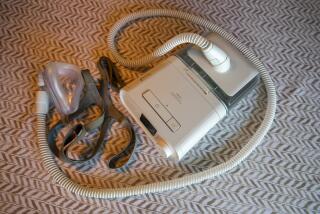‘Secondhand’ Medical Devices
- Share via
Manufacturers of medical devices are sounding an alarm that some hospitals are harming patients by reusing “single-use” medical devices like biopsy needles and cardiac catheters. They cite incidents in which improperly “reprocessed” devices have infected patients with bacteria and harmed them during surgical procedures.
The troubling accounts point to a solution sought by the manufacturers, calling on the Food and Drug Administration to flatly ban the reuse of all single-use devices.
But problems outlined by Times reporter Sylvia Pagan Westphal suggest that a solution is not so clear-cut.
The dangers posed by reused medical devices are uncertain because the current system for evaluating their safety is woefully inadequate. Independent, peer-reviewed studies of reused disposable devices are few, and those that have been done, experts agree, are not sufficient to conclude that reprocessing disposable devices is either safe or unsafe.
The manufacturers’ argument is grounded more in self-interest than in science. The U.S.-dominated medical device industry has become hugely profitable, with global sales in 1996 of $130 billion. The industry fears its profits will decline if the FDA continues to allow hospitals to save up to half of their medical device costs by reusing devices rather than buying new ones.
Solving the problem will require innovative thinking. The FDA lacks the resources to oversee medical device reuse. Its funding has already been stretched thin by the surging burden of monitoring prescription drugs and dietary supplements. Medical device manufacturers, in turn, have so far shown little interest in funding studies that would undermine their business.
The FDA should explore requiring both reprocessors and device manufacturers to contribute annually to a fund for independent safety studies. It should also work with the Joint Commission for the Accreditation of Health Care Organizations to require hospitals to abide by national protocols or contract out reprocessing work to the four private companies that successfully overhaul tens of millions of medical devices each year.
Congress had a hand in creating the present crisis. It passed laws in 1992 and 1996 that weakened medical device oversight. It could have a hand in resolving the problem by passing a bill by Sen. Richard Durbin (D-Ill.) that would require hospitals reporting malfunctions of medical devices to specify to the FDA whether those devices were new or reused.
The United States leads the world in innovating medical devices but lags in regulating them. Government and industry need to begin working together to eliminate this conflict.





